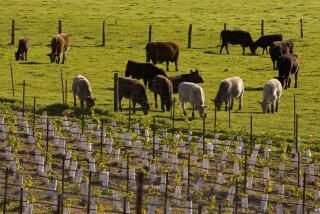Going to the Source for Fresh Beef, Pork
- Share via
EAST RUTHERFORD, N.J. — Although most folks are content to shop for their meat in a local grocery, it is still possible in North County to purchase a live pig or cow and have it processed for the table.
Livestock is not known as one of the area’s main industries, but Ron and Cheryl Lange and their son, Nolan, raise pigs and cows and sell them individually. The Lange ranch, tucked deep in the heart of De Luz Canyon in Fallbrook, is home to several dozen pigs and eight cows.
In one corral, several cows munch noisily on a mix of almond hulls and molasses, among other protein-rich ingredients. An inquisitive muzzle pushes insistently through the railings, as Nolan Lange, 15, feeds one of his heifers a slice of persimmon. The daily routine for this young farmer, who raises prize-winning cattle as part of a 4-H project, includes spending long stretches of time at the grooming chute to condition and brush the cows’ thick black coats to a lustrous sheen.
In addition to the cattle, Nolan and his parents raise swine. Cheryl Lange was a real estate agent in Los Angeles for 10 years before her husband read an article that inspired him to raise pigs. “The first one he brought home smelled so bad I had him give the animal a bath,” she recalls.
Ron Lange, who several days a week is a firefighter in Los Angeles, grew up on a farm in Michigan.
On a small hill behind the Lange home, a dozen Duroc pigs grunt and jostle for position along a low fence. “In my view, a good Duroc pig has more muscle and is leaner than other breeds,” Ron Lange said, as one of the small, red-haired pigs sniffed at his boots.
Contrary to popular belief, pigs are quite clean, Ron Lange says. Because pigs have no sweat glands, they like to wallow in muddy ponds during hot weather to cool off. Dreams of mud seem far from the beasts’ mind on this chilly winter morning, as loud snores emanate from a tightly huddled bundle of swine inside the small barn. Nearby, a larger corral is home to a mass of squealing Chester whites and Yorkshires foraging for scraps. The whites are great on the barbecue, Ron says, and both are delicious when smoked.
Piglets are usually born during February and March and reach their ideal market weight of 200 to 250 pounds six months later. The second breeding season takes place in summer. Anyone interested in purchasing a piglet, however, can call any time of the year.
Most of the Langes’ customers have the animals slaughtered, although some will keep a pig as a pet. The Langes don’t do the slaughtering. For that, they recommend turning to the experts.
Morrie’s Custom Cutting in Ramona is one of the oldest custom butcher shops in California. Forty years in the same location, Morrie’s was founded by the grandfather of current owner Mickey Shidner.
Mickey’s father, Morrie, took the shop over from his father after beginning his apprenticeship in the trade when he was 8 years old. After acquiring years of experience with several old-time butchers in Escondido, Morrie opened his own shop.
Mickey Shidner’s own training began when he was 10 years old. “I come from a line of butchers that goes back 200 years,” he says. “People find out about us mainly by word of mouth.”
Five years ago, Shidner found himself at the helm of the family enterprise.
When an animal has attained desired weight, customers call for an appointment to have it slaughtered, which is done on the customer’s property. The animal is then taken by refrigerated truck to the processing plant for custom aging, cutting and wrapping. The shop manufactures sausages, but sends items to be smoked to Alpine Meats. Processing a cow takes about 2 1/2 weeks; a pig takes about one week.
Fewer and fewer individuals raise livestock on a small scale, Shidner said, and, as a result, the custom butchering trade is disappearing. “In five or 10 years, you probably won’t find anyone raising cattle,” he said.
Other custom butchers in the area include Nick Carbone of the Fallbrook Meat Co. and Robby Bertheola of Ramona Meats. Both contract out the actual slaughtering, then process the carcass to customer specifications.
Carbone and Bertheola each said that one of the busiest times of the year is during the Del Mar Fair, when 4-H’ers sell their cattle at auction after the show.
Rancho Cheron Livestock, Ron and Cheryl Lange, 40288 DeLuz Murietta Road, Fallbrook, 92028. 723-9193. Full-grown, market animals usually $1 a pound, but 75 cents a pound through January. Grain-fed 8- to 10-week-old piglets about $50 each, depending on size and availability.
Morrie’s Custom Cutting, 1046 Elm, Ramona, 92065. 789-0740. Slaughtering fees range from $25 to $35 for a cow; $20 to $25 for a pig. Custom cutting, 30 cents a pound. Hours are 8 a.m.-5 p.m. Monday-Friday, 8 a.m.-noon Saturday.
Fallbrook Meat Company, 325 N. Brandon Road, Fallbrook, 92028. 728-3222. Slaughtering fees are $30 per cow or pig, $20 per lamb. Custom cutting and wrapping, charged by weight, averages about $85 for a pig, including smoking of bacon and ham.
Ramona Meats, 2330 Main St., Ramona. 789-3044. Custom cut beef averages 27 cents a pound; custom cut pork, 30 cents a pound.
More to Read
Sign up for Essential California
The most important California stories and recommendations in your inbox every morning.
You may occasionally receive promotional content from the Los Angeles Times.













